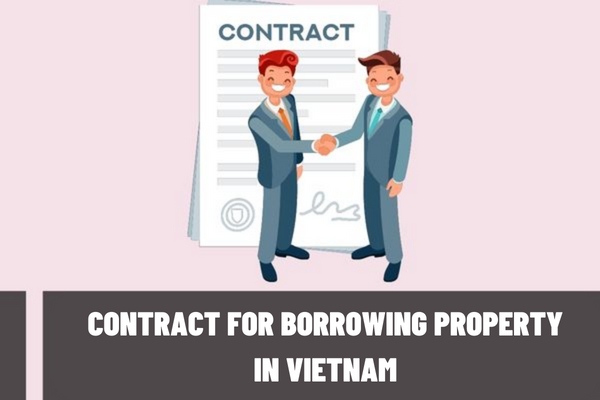What is a contract for borrowing property in Vietnam? What are the rights and obligations of the parties when borrowing property?
What is a contract for borrowing property in Vietnam?
According to the provisions of Article 494 of the 2015 Civil Code of Vietnam, contract for borrowing property means an agreement between parties whereby a lender delivers property to a borrower for use free of charge for a period of time and the borrower returns the property at the end of the period of time or when the purpose of the borrowing has been achieved.
The subject matters of contract for borrowing property include all non-consumable properties pursuant to Article 495 of the 2015 Civil Code of Vietnam.

What is a contract for borrowing property in Vietnam? What are the rights and obligations of the parties when borrowing property?
What are the contents of the contract for borrowing property in Vietnam?
The content of the contract for borrowing property is prescribed as the content of a civil contract in Article 398 of the 2015 Civil Code of Vietnam, as follows:
Contents of contracts
1. The contracting parties may agree on the contents of a contract.
2. A contract may have the following contents:
a) Subject matter of the contract;
b) Quantity and quality;
c) Price and method of payment;
d) Time limit, place and method of performing the contract;
dd) Rights and obligations of the parties;
e) Liability for breach of contract;
g) Methods of settlement of disputes.
Thus, the contracting parties may agree on the contents of a contract. A contract may have the following contents:
+ Subject matter of the contract;
+ Quantity and quality;
+ Price and method of payment;
+ Time limit, place and method of performing the contract;
+ Rights and obligations of the parties;
+ Liability for breach of contract;
+ Methods of settlement of disputes.
What are the rights and obligations of the parties when borrowing property?
For borrowers of property:
Article 496 of the 2015 Civil Code of Vietnam stipulates the obligations of borrowers of property as follows:
The borrower must fulfill the following obligations:
- Take care of and preserve the borrowed property and not to change the condition thereof at the volition of the borrower. The borrower must repair any normal damage to the property.
- Do not on-lend the property to any other person without the consent of the lender.
- Return the borrowed property on the due date. If there is no agreement on the time for returning the property, the borrower must return the property immediately after the purpose of the borrowing has been achieved.
- Compensate for damage where the borrower causes damage to or loss of the borrowed property.
- The borrower must bear the risk in relation to the borrowed property during the period of late return.
Article 497 of the 2015 Civil Code of Vietnam stipulates the rights of the borrower as follows:
The borrower has the right to:
- Use the borrowed property strictly in accordance with its utility and agreed purpose.
- Require the lender to reimburse reasonable expenses incurred in carrying out repairs or improvements to the borrowed property which increase its value if so agreed.
- Do not bear liability for normal wear and tear of the borrowed property.
For lenders of property:
Article 498 of the 2015 Civil Code of Vietnam stipulates the obligations of lenders of property as follows:
The property lender must fulfill the following obligations:
- Provide necessary information on the use of the property and its defects, if any.
- Reimburse the borrower for expenses incurred in carrying out repairs or improvements to the borrowed property which increase its value if so agreed.
- Where the lender knows but fails to notify the borrower of a defect in the property which results in damage to the borrower, to compensate the borrower for such damage, except where the borrower knows or should know of such defect.
Article 499 of the 2015 Civil Code of Vietnam stipulates the rights of the property lender as follows:
- Reclaim the property immediately after the borrower has achieved its purpose where there is no agreement on the borrowing period. If the lender suddenly and urgently needs to use the borrowed property, the lender may reclaim it upon giving reasonable prior notice to the borrower, even if the borrower has not yet achieved its purpose.
- Reclaim the property where the borrower fails to use it strictly in accordance with the agreed purpose, utility, or method or where the borrower on-lends the property without the consent of the lender.
- Demand compensation for damage to the property caused by the borrower.
When is the contract for borrowing property terminated?
Real estate loan contract is one of the types of contract according to the provisions of civil law. Therefore, the contract for borrowing property will terminate in the following cases according to Article 422 of the 2015 Civil Code of Vietnam as follows:
- The contract has been completed;
- The parties so agree;
- Where a contract is only able to be performed by a particular natural person or juridical person having entered into the contract, and that particular natural person dies or that juridical person ceases to exist.
- The contract is cancelled or unilaterally terminated;
- The contract is not able to be performed because the subject matter of the contract no longer exists;
- The contract terminates as prescribed in Article 420 of the 2015 Civil Code of Vietnam;
- Others circumstances as provided by law.
LawNet